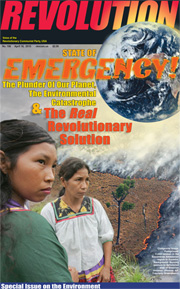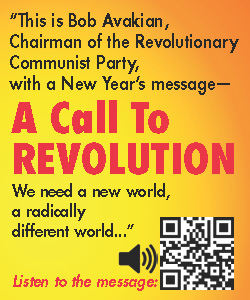Revolution #335, April 13, 2014
(revcom.us)
Voice of the Revolutionary Communist Party, USA
Please note: this page is intended for quick printing of the entire
issue. Some of the links may not work when clicked, and some images may be missing.
Please go to the article's permalink if you require working links and images.
Permalink: http://revcom.us/a/335/new-UN-climate-panel-this-criminal-system-is-destroying-our-planet-en.html
Revolution #335 April 13, 2014
New UN Climate Panel Report:
This Criminal System Is Destroying Our Planet!
By Orpheus Reed | April 7, 2014 | Revolution Newspaper | revcom.us
On March 31 the Intergovernmental Panel on Climate Change (IPCC) released its latest report on the dangers of climate change, “Climate Change 2014: Impacts, Adaptation and Vulnerability.” This IPCC report is the second piece of its current report—the fifth assessment report published over the last 25 years.
With each report, the warnings of this panel get more alarming, the dangers clearer and the stakes higher. The 2014 report establishes that climate science as a whole has concluded that climate change is not a far off, abstract danger but is already impacting “natural and human systems on all continents and across the ocean.” The negative effects of climate change are hitting especially hard at the poor people and poor countries on this planet, who have done the least to cause the problem. It makes very clear that unless there are dramatic changes that happen very soon, there will be devastating and possibly even catastrophic impacts on the natural world and on human life from the warming of the planet and climate change.
For 25 years, the IPCC has warned the world of the danger to the climate. Despite all of these warnings, and against the opinions of 97 percent of the world’s climatologists and a growing mountain of shocking and extremely frightening studies done by smaller scientific teams (more later), nothing that matters a damn has been done by the world’s ruling powers to stop or even address this roaring emergency. We are truly on course for a climate and humanitarian disaster, and we must move now to change this course before it’s too late.
What the IPCC Summary for Policymakers Highlights
The impacts climate change is already causing in the world:
- Glaciers continue to shrink all over the planet, due to the planet warming. This is affecting water supplies for people in many regions.
- Climate change is warming and thawing permafrost in far northern regions. Permafrost is soil in layers that has been frozen two years or more, but much has been frozen far longer. Thawing of permafrost is very dangerous because it contains large quantities of frozen organic matter. So when it thaws, methane and carbon dioxide from this previously frozen matter is released into the atmosphere, further warming the planet.
- Many different species on land and sea are shifting their geographic ranges, migrations, and seasonal activities in response to climate change, and this is affecting the health of species and their interactions. The report says while climate change has so far been proven to have caused only a few recent extinctions of species, in the past more gradual, natural climate change caused big shifts in ecosystems and extinctions of species. This point raises the danger that as thing go forward, species extinction will become much worse.
- There are increasing human impacts from climate change—deaths from heat waves, floods, and cyclones, as well as impacts from increasing droughts and wildfires. These impacts are already interacting with and making social inequalities worse—hitting poor people and countries the hardest.
The increasing impacts and risks to come as climate change advances:
- The report says, “Increasing magnitudes of warming increase the likelihood of severe, pervasive and irreversible impacts.”
- The amount of the world’s people experiencing water scarcity in some regions or times, and on the other hand major river floods in other regions or times, will increase with continuing warming.
- There is increased risk of extinction of “a large fraction” of land and sea species, as climate change interacts with other environmental stresses.
- Sea-level rise will cause low-lying coastal areas to erode, flood, and in some cases be submerged.
- Climate change will cause a vast redistribution and reduction of ocean-living species causing a severe reduction in fisheries’ productivity.
- Ocean acidification, caused by carbon dioxide being taken up by the seas, poses big risks to life in the oceans, especially in the polar regions and coral reefs.
- Production of major food crops like wheat, rice, and maize will be negatively impacted in tropical and temperate regions. There are potentially huge risks to the global food supply if the world warms an additional 4 degrees Celsius (7.2 degrees Fahrenheit) or more. (At least 3-4 degrees Celsius increase and even more is what scientists are predicting if the current emissions path continues as it is.)
- All of this will hit the world’s poor people and countries hardest, and will make poverty worse. Poor people will disproportionately suffer and be impacted by heat stress, extreme rainfall, flooding, landslides, air pollution, drought, water scarcity, and lack of food.
- Climate change will increase the displacement of people and increase the risks of violent conflict—civil war and other “inter-group violence”—by making poverty and economic shocks worse.
The IPCC report also addresses possible ways to adapt to the transformations climate change is causing—things like ways to prevent the worst of storm surges from powerful hurricanes, flooding, etc. Such “adaptation,” to the extent it was attempted, would be highly unequal, given the huge gap between have and have-not countries in the world. But even more fundamentally, what is clear from this report as well as the picture from climate science in general is that no amount of adaptation can deal with the truly horrific impacts to come. What is needed are massive emergency efforts right now to STOP the emissions of greenhouse gases from burning fossil fuels and other causes, and to transform the entire energy foundation of human society. Reversing the environmental crisis requires revolution, and the battle now to STOP the devastation of the environment can and should contribute to and be increasingly linked to the overall movement for revolution. The conclusion one must make based on this report is one of a particularly horrific future for the vast majority of humanity—the poor and dispossessed in the oppressed countries of the world—already facing extreme struggles to eat, sometimes starving, suffering from disease and lack of clean water, health care, etc. All of this will be made unimaginably and likely even catastrophically worse if the current trajectory of the warming planet continues.
The IPCC Consensus and the Actual State of Things
Thousands of scientists from over 100 countries contribute to the IPCC reports. So the reports represent the overwhelming consensus of the world’s climate scientists based on a thorough review of scientific studies that have been peer-reviewed and published, from many converging streams of evidence. Because of the consensus—everyone has to agree on the final conclusions written in the report—these reports end up being a kind of “lowest common denominator” in describing impacts and dangers. Past IPCC reports have in certain respects underestimated the speed and level of climate impacts, particularly the speed of melting of Arctic ice. Climate scientists such as Michael Mann and Stefan Rahmstorf have pointed out that the IPCC represents an important consensus of climate reality and prediction but, if anything, tends to underestimate the level of future temperature and sea level rise. In an important interview with Michael Slate on KPFK, Mann talks about what the current report shows and comments on how striking it is that despite this built-in conservative pull, the report draws such stark conclusions.
Unfortunately, as stark as the reality the IPCC demonstrates is, the actual level of danger the world faces is very likely worse. This is especially so because of the reality that as the climate warms to certain levels, new dangerous processes can be unleashed that cause even greater and sometimes qualitatively more warming. The melting of permafrost and frozen methane in the oceans and the melting of polar ice are examples of these “positive” feedbacks that, when they certain levels, can reinforce warming further and can even cause larger qualitative changes to a different state—climate tipping points.
In 2012, climate blogger Joe Romm, a climate scientist and senior fellow at Center for American Progress, put together a summary of conclusions of many of the latest peer-reviewed scientific climate studies. In looking into just a few of these, the conclusions are beyond hair-raising.
Here are just a few things these studies found:
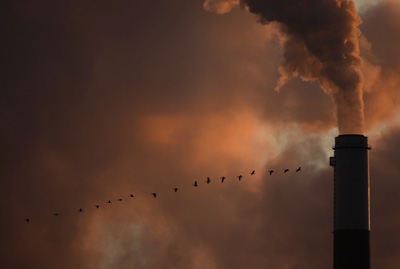
A flock of geese fly past a smokestack at the Jeffery Energy Center coal power plant near Emmett, Kansas. Photo: AP
-
An article by Jeffrey Kiehl in Science magazine in 2011 looked into “lessons from earth’s past.” Scientists can study past temperature and carbon dioxide (CO2) levels through various means. If global carbon levels continue to grow as they are over the next century, they are expected to reach between 900 and 1100 parts per million by century’s end. After examining evidence from past geologic ages, Kiehl found that the last time CO2 levels were this high was 30-100 million years ago and that temperature levels at that time were 16 degrees C (29 degrees F) higher than now on average. Kiehl concludes, “If the world reaches such concentrations of atmospheric CO2 positive feedback processes can amplify global warming beyond current modeling estimates.” In other words, given the same CO2 levels, past real world temperatures were actually worse than the most dire predictions of what Earth’s temperature in 2100 will be.
- The UK Met Office (Britain's national weather service) Hadley Centre for Climate Prediction and Research predicted in a study in 2006 that on current course, drought will impact 1/3 of the Earth’s land mass by 2100.
- A study in Nature magazine in 2010 found that over the past century, the ocean’s phytoplankton declined by 40%. The authors say they believe this has happened as a result of global warming causing rising sea temperatures. One of the co-authors, marine biologist Boris Worm, said, “I’ve been trying to think of a biological change that’s bigger than this and I can’t think of one. ... Phytoplankton are a critical part of our planetary life support system. They produce half of the oxygen we breathe, draw down surface CO2 and ultimately support all of our fishes.”
Yet none of the evidence pointing to a catastrophic future if things continue as they are, is stopping the continual pumping out of greenhouse gases. Levels of carbon dioxide have already climbed to over 400 parts per million—levels not seen in all of human history. Not only are greenhouse gases continuing to build up, the rate of their build-up has increased! Instead of stopping this, the ruling classes of the dominant capitalist powers, who have a stranglehold on the world’s economy and political power, only accelerate the emergency.
It must be confronted by humanity that the stakes of this are, quite possibly, whether we as humans will be able to survive on this planet and whether most of the world's species will also be driven out of existence. The trajectory we are on is one of catastrophic and horrific changes, changes that are accelerating and picking up momentum in ways we never would have imagined 20 or maybe even 10 years ago. But now these changes are upon us and threaten to spiral completely out of control.
When the IPCC report came out, U.S. Secretary of State John Kerry said, “The costs of inaction are catastrophic.” Yet he represents the world power most responsible historically for the build-up of CO2. Barack Obama vows to “act if Congress won’t” on climate change while building the U.S. up to be the world’s leading producer of oil and natural gas, and among the world leaders in coal production and export—the very materials whose burning is bringing this catastrophe. The U.S. and all the other capitalist powers wring their hands over the danger while they continue to be compelled by their system’s laws to race to find and burn even more destructive unconventional fossil fuels in their mind-numbing battle to outpace each other. All of this is beyond hypocrisy and cynicism—this is systemic, sickening destruction of everything.
The release of this report has provoked widespread expressions of concern and outrage—for millions, it has been a wake up and shake up call. And it should be. But far more people need to be woken up and shaken up! Given this I have some questions for people. Is what’s realistic to bury your head in the sand or only let in as much of the actual reality as you “can handle”? Is what’s realistic to expect that these capitalist criminals who are destroying the entire world and threatening to take us out of existence, are capable of stopping this? Or is what’s realistic to wake up and realize we need dramatic transformations that can only come from an actual revolution and a new socialist system—based on people being caretakers of the Earth and being mobilized to move heaven and earth to combat environmental disaster? This is our only real hope. Whether or not people agree with that, we have to come together, awaken humanity, and fight to stop these criminals from potentially taking us and most of our natural world out of existence.
Permalink: http://revcom.us/a/335/the-human-costs-of-climate-change-en.html
Revolution #335 April 13, 2014
The Human Costs of Climate Change
April 7, 2014 | Revolution Newspaper | revcom.us
Past reports from the Intergovernmental Panel on Climate Change (IPCC) have focused on the negative effects of climate change on the Earth and the natural world. One of the key “take home messages” from the latest IPCC report is the immense impact of climate change on human beings—now and even more so in the coming decades. As we emphasized in the special issue of Revolution, State of EMERGENCY! The Plunder of Our Planet, The Environmental Catastrophe & The Real Revolutionary Solution, the health, well-being, and even continued existence of humanity is linked to and dependent on healthy, vibrant, and intact natural ecosystems.
If the build up of greenhouse gases continues on its current course, the IPCC report warns, everyone on the planet will be affected—but the impact on the majority of world humanity living in the poor countries of Africa, Asia, and Central and South America, will be devastating.
Let’s look at, and really think about what climate change is causing for people in the world right now, and what the future will look like for human beings if this is not combatted and things turned around.
More Severe and Destructive Weather
In 2010, one of the hottest summers on record caused higher temperatures in the Atlantic Ocean, fueling torrential monsoons. In Pakistan these intense storms brought unprecedented flooding, an estimated one-fifth of the entire country was under water. Thousands of people were swept into the flood waters to drown and 15 million were displaced from their homes. That same summer, Russia suffered the worst heat wave in recorded history, killing thousands and sparking massive wildfires that burned entire villages to the ground. Last year Typhoon Haiyan/Yolanda hit the Philippines with wind speeds that were the highest ever recorded in human history. Its power was likely enhanced by the warming oceans and its storm surge was made worse by already heightened sea levels from global warming. More than 10 thousand people were killed and whole villages were swallowed up by the ocean. Think about Bangladesh, where rains and storm surges from powerful cyclones have already caused massive flooding of large parts of the country, spreading death and destruction. Think about Hurricanes Katrina and Sandy.
Now think about a future world where these kinds of storms, already fueled by the warming planet, are made even more intense and more frequent.
Effects on Availability of Basic Human Necessities
What will the IPCC predictions of the future really mean for basic survival? Basic necessities of life—food, clean air, clean water, etc.—will be harder to procure, possibly unattainable for growing numbers of people. Fish that whole nations rely on for survival will be vastly depleted, possibly many species gone. This means growing suffering and starvation for untold numbers of people. There will be more deaths from heat waves. Killing droughts in certain regions will become “the new normal” and increasing suffering and death caused in some regions by powerful storms, more intense rainfall, flooding along rivers and for whole island nations and along coastlines. All of this, already terrible, will take place on a vastly larger, horrific global scale—and again, all this will hit Third World countries hardest.
All the people who have the worst conditions already, the least protection in terms of housing, health services, food safety, infrastructure, personal security, and community services will suffer on a much higher level. Worsening climate change will affect the whole fabric of human society—exacerbating displacement and forced migrations of large numbers of people, conflicts and wars between different sections of people, battles over shrinking resources. The disproportionate effect between countries will also be disproportionate inside all countries—the poor will suffer the most in urban and rural areas all over the planet.
Danger of Tipping Points
With the “business as usual” predicted global mean temperature rise of four degrees C or more—the IPCC Summary report says the risks include “severe and widespread impact on unique and threatened systems, substantial species extinction, large risks to global and regional food security, and the combination of high temperature and humidity compromising normal human activities, including growing food or working outdoors in some areas for parts of the year.” It continues to say that with rising temperatures, there is the uncertain but real risk of crossing multiple tipping points (thresholds for abrupt and irreversible change) “in the earth system or in interlinked human and natural systems.”
In a piece written for Australia’s The Conversation, IPCC contributors Colin Butler, Helen Louise Berry, and Anthony McMichael say, "Human-driven climate change poses a great threat, unprecedented in type and scale, to well-being, health and perhaps even to human survival."
There is growing opinion in scientific circles that the four degrees C (seven degrees F) or higher temperature rise predicted under the current emissions trajectory could be incompatible with the continued existence of human civilization.
At the time of the Warsaw UN Climate Talks in December 2013, Alice Bows and Kevin Anderson, climatologists with the Tyndall Centre for Climate Change Research at the University of Manchester, England, said that a predicted global temperature rise of 4 degrees C would mean the hottest days on earth would be 6-12 degrees C (11-22 degrees F) hotter. This would cause large-scale sea level rises and huge drops in production of food crops. Dr. Bows said, "Those sorts of things would be absolutely devastating—they would be catastrophic.... There's a widespread view that four degrees could be incompatible with organized global community and would inevitably lead to conflict and disruption and could potentially be beyond adaptation. Ecosystems are already being threatened—at four degrees we have irreversible impacts on ecosystems."
Think about this: the climate crisis has been brought on principally by the economic patterns of functioning of the richest capitalist countries that dominate the planet. This is who is responsible for the vast majority of the greenhouse gas emissions in our atmosphere, and who is continuing to do this despite the incredible threat. But who suffers the most are the people who have done the least to create this problem. This is a tremendous indictment of the system of capitalism-imperialism and the way it twists and perverts human life and well-being in the current world, and in the way it threatens the very survival of all of us.
We face perhaps the most daunting threat ever in human history—possibly to the continued existence of human civilization and humanity itself, and the entire natural balance of world ecosystems.
Permalink: http://revcom.us/a/335/scientist-michael-mann-on-the-new-climate-report-en.html
Revolution #335 April 13, 2014
From The Michael Slate Show: Scientist Michael Mann on the New Climate Report: “This is a threat to us... here and now”
April 7, 2014 | Revolution Newspaper | revcom.us
Dr. Michael Mann, Distinguished Professor of Meteorology at Penn State University and director of the Penn State Earth System Science Center was interviewed on April 4 on The Michael Slate Show on KPFK Pacifica radio station about the recently released report from the Intergovernmental Panel on Climate Change (IPCC). The following is a transcript of that interview.
Michael Slate: The last report from the IPCC came out seven years ago. Now there’s a new one. What’s changed since then and where are things at now?
Michael Mann: Well it’s really striking when you read this latest impacts report. There are three different parts of the IPCC report: the basic scientific evidence that came out just this last fall; this latest report is on the impacts of climate change, adaption, vulnerability; and next month they will be reporting on the final installment, and that’s on mitigation solutions, what we can do to mitigate the problem of climate change. This latest impacts report was striking, and really just how stark, the stark nature of the terms in which it is laid out. This is a very conservative report by its nature, because this is a consensus of literally hundreds of leading scientists around the world. And so the report reflects almost a lowest common denominator of what all of the scientists can agree upon. In that sense, it’s remarkable that the report states the threat in as stark terms as it does. Basically, what this latest report makes clear, if there were any question, is that climate change is not just some abstract, far off, existential threat. It’s not just something that is going to impact polar bears in the Arctic decades from now. It’s something that’s impacting us here and now negatively. And in a sense, we are the polar bear. We are seeing the negative impacts of climate change, whether you are talking about issues of food and fresh water availability, whether you’re talking about availability of land, whether you’re talking about human health, whether you’re talking about the health of our economy, whether you’re talking about issues of conflict and national security, which after all, are a consequence of competition for available resources. And what the report makes very clear is that if we continue on the road that we’re on right now with ongoing fossil fuel burning, we will see diminished food, water and land and greater competition for diminishing resources among a growing global population. And that’s a perfect prescription for issues of conflict, for basically a national security calamity.
So the IPCC makes quite clear in this latest report that climate change is a big problem. It’s not just that we know that we’re warming the planet, that it’s caused by human activity, the fossil fuel burning and other activities raising greenhouse gas concentration—there is now an established consensus among the world’s scientists that this is a threat to us now, here and now.
Michael Slate: Yeah, that actually came across very clear, and I think it’s something that... one, is that consistently over the years, it’s been consistent like, well yeah, they’re warning us now, but really, what’s the rush, we actually can do something about this. I wanted to ask you about this, it’s bugging the hell out of me, the idea that, talking about climate change, about the temperature rising, change from 2 to 8 degrees Celsius, this span—is that happening now? Is that what’s happening? And what does it mean if it does?

The melting of the Grinnell Glacier in Glacier National Park, Montana. The top photo was taken about 1940, the bottom was taken in 2004. Photo: AP
Michael Mann: Yeah, so we’ve already warmed up, we’ve warmed up the planet just under one degree Celsius, about a degree and a half Fahrenheit so far. It turns out; we are already committed to at least another half degree Celsius, almost another degree Fahrenheit. That’s just because of the greenhouse gases we’ve already emitted into the atmosphere. They will continue to warm the planet for decades, even if we were to stop fossil fuel burning cold turkey right now. We would still see the planet warm for decades into the future, just because of the inertia of the climate system. The oceans continue to absorb some of the heat that we’ve already put into the atmosphere from increased greenhouse gases. So we’re already committed to probably the better part of 2 degree Celsius, a degree and a half Celsius minimum. And what the science tells us is that if we continue business as usual fossil fuel burning for another decade or so, we will almost certainly commit to more than 2 degrees Celsius warming, more than 3 and a half degrees Fahrenheit warming. And that’s an important number because that’s actually the threshold that many organizations and scientists who look at the impacts of climate change will tell you, that 2 degrees Celsius threshold, is where we really start to see some of the most damaging and potentially irreversible impacts of climate change. Again, whether we’re talking about food, water, land, health—across the board, the health of ecosystems, every aspect of our lives, we will see increasingly negative impacts. And so there’s an urgency to this problem unlike anything we’ve seen before. If we don’t act now we likely commit to at least 2 degrees Celsius. If we continue with business as usual, if we just continue to burn fossil fuels without any effort to regulate carbon emissions, to lower our carbon footprints, then what the report tells us is that we could see as much as 4 or 5 degrees Celsius, 7, 8, 9 degrees Fahrenheit warming of the globe by the end of the century. And as my colleague James Hansen, the former director of the NASA Goddard Institute for Space Studies once put it, if we warm the planet that much, it’ll be a different planet. It won’t be the planet that we grew up on. We will be leaving a fundamentally degraded planet behind for our children and grandchildren.
Michael Slate: One of the things you keep pointing to is the idea, or the fact, well there’s two things. The fact that this is actually on the map now. It’s actually concretely happening now in terms of climate change. And I wanted to talk about that, and in relation to, that both what’s happening with food, for instance in the vast majority of the world, which is a constant question. You could see the famines that exist in all parts of Africa and other places. If you’ve traveled through the Third World at all you have some understanding of how desperate some people are for the barest minimum diet. And you guys have been saying this is going to have terrible an impact on crop yield and food. Let’s explain that.
Michael Mann: That’s one of the tragedies here, that in fact the worst impacts, and the impacts that are going to come the soonest, are going to be felt in the developing world, precisely those areas in the tropics where you have nations who are currently struggling to meet their needs when it comes to fresh water and food. That’s actually where climate change initially is going to hit hardest. And some of that is based on really fundamental science. If you warm temperatures even a little bit in the tropics, we know that you see very large decreases, very substantial decreases in the productivity of basic cereal crops. And that’s simply because those crops are already growing at the limit of temperatures, the warmest temperatures they can grow at. And if you warm even a little bit you see sharp drop offs in agricultural yields. And so ironically and tragically, those nations that are least able right now to meet their food needs, we will see the largest decreases. Now we used to think, as recent as the last IPCC report, if you read the chapter on agriculture in the impacts part of the last IPCC report, there was language that suggested that we could actually see increases in agricultural yields in some extra-tropical regions, like the United States, North America, Europe, other areas at higher latitudes. The idea being that you get longer growing seasons in a warmer planet. Winter is shorter, the growing season is longer, and all else being equal, that would seem to imply increased agricultural yields. But something we’ve seen over the past few summers in particular is that any theoretical increase in yields that might result from longer growing seasons appears to be getting completely wiped out by increasingly extreme weather events—more widespread and pronounced drought, over large parts of the U.S., like we’ve seen in recent summers in Texas and Oklahoma. In summer 2011, Texas, their agriculture was devastated. They lost 25 percent of their livestock because of the record 2011 drought. Two summers ago we saw record drought and heat over a large part of our breadbasket and agricultural yields were decimated. And so we now think that even extra-tropical regions where we thought maybe we could see an increase in agricultural yields, even here we will see decreases. And that’s why this latest report comes to a much starker conclusion when it comes to food, our ability to meet our food needs. And again what we’re talking about is a growing global population. And in the face of diminishing food and freshwater, that’s a calamity in the making.
Michael Slate: There’s a point here that gets repeated in the report. I think it’s important for people to understand what’s meant by this. It keeps talking about adaptation and adapting in relation to this. Can you explain what’s going on there? And then I have a follow-up question.
Michael Mann: Sure thing. So our presidential science advisor, John Holdren, who’s a leading scientist, he’s been a very effective spokesperson for this issue in the current administration, I think he once framed the problem best when he said that how we’re going to deal with climate change is going to be a combination of three things. It’ll be some combination of adaptation, of mitigation, and of suffering. And it’s up to us to decide what is an acceptable combination. Now we are already seeing the suffering. There’s a certain amount of climate change that’s already locked in. It’s already happened and there’s more that’s in the pipeline. And what that means is that there’s already some suffering and there’ll be more suffering in the future. It means that we already have to begin adapting, whether we’re talking about building up our coastal defenses against sea level rise and increasingly devastating hurricanes, whether we’re talking about adapting agricultural practices in the face of warming temperatures, worse drought, on down the list. There are a whole bunch of things that we need to start doing to build the adaptive capacity, to deal with some of what’s already in the pipeline and is coming. But, the fact is that if you look at sort of those business as usual projections, if we continue on the course that we’re on, by the end of the century we are talking about changes in climate that are so unprecedented that there’s no amount of adaptation that will basically maintain any degree of resilience in the face of the impacts on food, and water and health and our economy. So the bottom line is, if you look at the projected impacts of this latest report, one comes to the conclusion that adaptation is not going to be adequate. We need to do a certain amount of adaptation no matter what. Because there’s a certain amount of climate change that’s already locked in. But the fact is that there’s a whole lot of other climate change that we can still prevent. And we need to engage in those actions necessary to prevent that. And that means reducing our carbon emissions. That means putting a price on the emission of carbons so that the marketplace will internalize the very real damages that climate change is already doing across the board.
Michael Slate: I was going to ask you, is there a point, is there a tipping point where adapting is clearly impossible, and you spoke to that. It seems to me there’s a dynamic that gets set in motion as well, which would both limit effective responses like, saying effective response would be adapting. But also adds a whole new dimension. I was reading somewhere about the melting Arctic that uncovers organic material that was there, frozen over before civilization began, that is suddenly laid bare and begins to rot and release all kinds of greenhouse gases and just compounds things a tremendous amount. That seems to be something people don’t often talk about, what gets unleashed in the sense of a dynamic that actually gets unleashed to take over.
Michael Mann: Yeah, absolutely. We sometimes call these positive feedbacks although that can be a misleading term to a lay audience that isn’t familiar with the sort of the lexicon of the science. It almost sounds good, “positive feedback,” you know, you get positive feedback from your boss for doing a good job. It’s not a good thing. What it means is that it’s a vicious cycle. It means it’s an aggravating response. And one of the feedbacks we worry about are these so-called carbon cycle feedbacks. And what that means in this case is, as you allude to, if you warm the soils, if you melt the permafrost in the Arctic, well it turns out there’s a whole lot of methane that’s currently locked up in that permafrost. There’s also a lot of methane that is locked up in sort of a crystalline form, solid form, in the continental shelves. And as we warm the planet, as we warm the oceans, and as we warm the permafrost, there’s the potential to destabilize all of that methane that’s currently locked up. Now methane, it turns out is an even more potent greenhouse gas than CO2 [Carbon Dioxide]. So if that kicks in, if we start to see those methane feedbacks kick in, then it means we suddenly get even more warming. And that’s not currently really taken into account because it’s too uncertain. We don’t know how to include it in the models because we don’t know exactly how much of that methane is unstable and could be released with even a modest amount of additional warming. So the great example of uncertainty despite what you might hear from critics—and you hear people say, well there’s uncertainty in the science, so why should we take these precautions that could damage the economy? Well, actually inaction is likely to damage the economy a whole lot more. But the fact is that uncertainty doesn’t weigh in our favor. In many respects the uncertainties are such that the problem could end up being a whole lot worse than we currently project. And here’s one good example of that—Arctic sea ice. Right now we are seeing a precipitous decline in the amount of ice that’s left in the Arctic at the end of the summer to the point where if we follow the current trend, within a couple of decades we will have ice-free conditions in the Arctic by the end of the summer. The models say we shouldn’t be there for decades, for fifty years or so. So we are already several decades ahead of schedule in terms of how fast that sea ice is diminishing, and with that decreased sea ice means a fundamental change in the Arctic ecosystems, it means a threat to the animals that rely on that environment, which of course includes the polar bear, walruses... what it means is that we are losing an entire ecosystem. We are losing a unique ecosystem, the Arctic ecosystem, that will not be replaced. What’s the value of the Arctic ecosystem? What’s the value of the Gulf of Mexico? These are the questions we should be asking as we continue to engage in very dangerous drilling of fossil fuel sources and the continued worsening of the climate change problem that’s resulting from that.
Michael Slate: All right Dr. Michael Mann, unfortunately we’ve run out of time but thank you very much for joining us today.
Michael Mann: Thank you, it was a pleasure.
Permalink: http://revcom.us/a/335/ba-everywhere-april-2014-climate-change-and-changing-the-whole-political-atmosphere-en.html
Revolution #335 April 13, 2014
BA Everywhere: April 2014
Climate Change and Changing the Whole Political Atmosphere
April 7, 2014 | Revolution Newspaper | revcom.us
This is a moment when, if you have your eyes open to the world, the stark reality of the wanton destruction of the planet—its air, water, climate, and all the forms of life that inhabit it—stands out as so big, so criminal, so outrageously dangerous, that you just want to scream. Such is the case with the UN Intergovernmental Panel on Climate Change report issued during the last week of March (see "New UN Climate Panel Report: This Criminal System Is Destroying Our Planet!"). Wrap your mind around global warming—what it means right now and where it is leading: food and water crises, the drowning of entire island nations and of once fertile deltas that are home to hundreds of millions of people; millions and millions of people with no locally available drinkable water; massive food scarcity pitting regions of people against each other; major coastal cities in the developed world such as New York, Miami, Boston facing rising oceans that will make disasters like the flooded subways of NYC during Hurricane Sandy or the submerged Lower Ninth Ward of New Orleans during Hurricane Katrina, the norm. All while the rich biodiversity of the planet may be irreversibly endangered with increasing numbers of species becoming extinct and the natural environment being destroyed at staggering rates.
Donate to radically change the world.
DONATE to the
BA Everywhere Campaign!
Click Here
Scientists have sounded the alarm. Students and concerned people have been speaking out and protesting. Hundreds have been committing civil disobedience—getting arrested trying to put a halt to fracking, to tar sands oil production and its associated pipelines, to name just a couple of the battles that people have been taking up to prevent the destruction of one or another part of our environment. With the UN report now public, the stakes are sharply defined. Climate change that is now causing great harm is moving in increasingly devastating ways toward great catastrophe. And there will be no break from this destructive course, unless there is a radically different approach—a fundamental change away from this profit-driven capitalist-imperialist system whose lifeline is fossil fuels—a radically different system and society that could unleash and unfetter the creativity and conscious activism of hundreds of millions of people to tackle this life-and-death problem for the Earth.
Right now, tens of thousands of people of all ages are being awakened, with many here in the U.S. and around the world acting in different ways to protect the environment. Millions more have their attention on this right now. April 22 is Earth Day—a day when for several decades people have gathered in different ways to take up issues of ecology and the environment. This year, the stakes and necessity of doing so are underlined throughout the world.
All those who recognize the urgency, who are now committing time and money to address saving the environment, need to be able to learn about, discuss, and debate the revolutionary solution to this and all the other forms of suffering that this system brings down on people—a way forward for humanity that is concentrated in the new synthesis of communism developed by the revolutionary leader, Bob Avakian—BA. It is this terrain—with these literally life-and-death questions for the future of the planet at stake—that the multifaceted mass fundraising campaign, BA Everywhere, needs to impact this month.
BA has developed a vision and framework for a radically new state power that will unleash the collective creativity of the people to overcome all forms of oppression and exploitation and will have, as a fundamental principle governing the development of the economy, "protecting, preserving, and enhancing the ecosystems and biodiversity of the planet for current and future generations."1 This requires revolution. And BA has developed a strategy for this revolution.
All of the people whose eyes are being opened, who are outraged at the lack of any serious comprehensive action by those who rule this profit-driven system that could really save the planet, need to be given an opportunity to donate financially and contribute in other ways to getting BA, and the revolutionary vision and strategy he has brought forward, known throughout society.
This is a moment, a month, to reach out to scientists, teachers, environmentalists, students, and many more with the full vision and understanding of the system that underlies all the problems humanity faces, with the liberating way forward, and to find the ways to involve them in the BA Everywhere campaign. BA begins his message on New Year's Day 2014 with this:
"We need a new world, a radically different world.
"Look at the world today. Destruction of the environment. Youth in the inner cities robbed of a future, 'presumed guilty' for being Black or Brown, hounded and shot down by police, incarcerated in huge numbers. Women raped, battered and murdered, denied their basic humanity and their full potential as human beings. People scorned, bullied, brutalized for being gay, or just being 'different.' Millions of children dying every year from starvation and disease. Immigrants driven from their homelands, forced into the shadows, exploited, deported, ripped away from their children. Slaughter and enslavement in the name of one god or another. Wars, torture, and massive government spying.
"Things are this way because of the system that rules over us and declares its 'special right' to rule the world. A system like this is a system that no one should put up with or go along with. It needs to be swept off the face of the earth. And it can be."
And BA has developed a vision and viable framework for this new society. Building on the overwhelmingly liberating experiences of the first socialist revolutions while learning deeply from their shortcomings, he has brought forward a new synthesis of communism that charts a path so that revolutions in the 21st century can do even better. The new socialist state would be working to overcome and dig up the roots of all the forms of exploitation and savage inequality that people suffer today; where no more would wars of plunder and subjugation of nations and cultures be aimed at the people of the world; and where a new constitution would require safeguarding the environment. This would be carried forward in a legal framework and societal atmosphere that gives great scope to intellectual work, ferment, and dissent so that people from every section of society, including those formerly locked out of the realms of intellectual (and scientific) life could consciously and collectively strive for a world where all humanity could flourish.
People concerned about the future of sustainable life on this planet need to know about this. With life hanging in the balance, doesn't this radical way out need to be discussed and debated everywhere? People can be won to see and to donate funds so that this can happen on a societal level.
And there is a lot to get into about why and how a total revolution is necessary for there to be a sustainable future. Capitalism cannot and will not reverse global warming or save the planet. The relentless drive to maximize profits—each capitalist up against competing capitalists, driven by the imperative to expand or die—is the underlying dynamic that prevents the capitalists and their governments from taking any meaningful action on climate change for fear of losing advantage and being wiped out.
In a new revolutionary socialist society, the economy will be governed by planned and rational production—and by the deployment of society's skills, resources, and capabilities—to serve what is useful and important for the betterment of world humanity including protecting the rich biodiversity and sustainability of the Earth.
This month BA Everywhere is calling for all who want to see this society-wide conversation about problem and solution to go out and meet all kinds of people who are concerned about the environment and to set up appointments, hold impromptu discussions (on campuses, in neighborhoods, or at lunch at work), and involve them in the campaign, donating and raising funds and raising consciousness. So that people are finding out about Bob Avakian, digging into what he has brought forward, learning about what the first socialist revolutions in the 20th century were about, and especially digging into the vision and strategy for fundamental change today that BA has developed. There should be lots of lively struggle over what is the root cause of all of this and why revolution is the solution.
The BA Everywhere campaign should be stepping to people with an appreciation of the work and concern people have for saving the planet and all its species, going into the deep roots of why this system does what it does and how revolution could change all that—comparing and contrasting, even struggling at times quite sharply, for why a revolutionary socialist society moving towards a communist world could really save the planet. Many taking up the campaign may not themselves know that much about the science of this yet, but still could watch the clip from BA's 2003 Revolution talk, "Not fit caretakers of the earth," and get into what he is saying there together with the people they are meeting with. And, we can also bring people the special issue of Revolution, State of EMERGENCY! The Plunder of Our Planet, The Environmental Catastrophe & The Real Revolutionary Solution, as well as the Constitution for the New Socialist Republic in North America (Draft Proposal), so that people can get into this themselves.
This should be a month where the campaign is sitting down with many, many people asking them to donate. There should be a sense of urgent mission to really reach out to the science departments at universities, to high school science teachers, to the board members and people active in local and national environmental organizations, nature conservancies, natural history museums, to bring them the full picture of the BA Everywhere campaign and to give them an opportunity to make a real difference by contributing so that this is known everywhere.
At the same time, these are not the only people and places that the campaign should reach this month. BA Everywhere is the leading edge of an entire movement for revolution—a whole strategic process through which people from a wide range of experiences and struggles are coming to understand the problem and solution and are being organized in different dimensions of the movement for revolution with the Party being built as its leading core. The environmental thematic focus of the campaign this month, the urgency of the UN report, and Earth Day on April 22 provide an important opportunity to deepen the understanding of the whole movement for revolution and the diverse breadth of people it impacts, of the necessity of revolution to quite literally save the planet—how the new society and state brought into being through revolution would deal with meeting the needs of humanity, overcoming all the inequalities, in a way that sustains and protects the environment and all the Earth's species. Making these connections will ideologically strengthen the movement for revolution and in turn change how people more broadly are thinking. At the same time, this should inspire people to become even more committed to raising the funds needed so that BA becomes a household word.
To sum up a few points for the campaign this month: The urgency of the rapidly developing environmental crisis, especially climate change, gives rise to great necessity as well as opens opportunities to reach out to and raise funds from a whole section of people who are on the front lines of and/or are deeply concerned about the environment, so that the vision and strategy for a whole new society is known and debated through people finding out about and digging into BA and his work. This involves the BA Everywhere campaign and the movement for revolution as a whole not just making plans for Earth Day on April 22, but getting out all month with the campaign—and not only among those who are active around environmental issues, but among all who are acting to resist the crimes of this system in various ways. BA Everywhere committees and everyone else who wants to take this up should send in their plans this week to baeverywhere@gmail.com
At the same time, there should be exciting plans to make an impact at the diversity of events on Earth Day as well as on campuses and in neighborhoods on that day. Right now, while funds overwhelmingly should be raised for the BA Everywhere campaign overall, with funds going to one of the three entities listed on the donate page of the website, BAE committees should go to a few donors to raise specific funds for printing materials and other expenses that will be incurred on and around Earth Day.
This system is destroying the Earth and the rich diversity of life that inhabits it. This is a crime of towering proportions. There is another way: revolution to bring into being a new society and world that truly emancipates humanity and that can unleash the creativity of millions to work together to urgently save the planet. Raising funds for and bringing to people the work and vision of BA is a key part of bringing that world into being.
The action—and the inaction—of those who rule this system in pursuit of accumulating more and more profit is devastating the Earth. It is up to us to change the whole system through a liberating revolution. To open up this potential requires, as a leading and pivotal step, building the movement for revolution now, involving lots of people in raising funds to change the whole political atmosphere, so that broadly people are discussing and debating really fundamental questions of why the world is the way it is and how it can be fundamentally changed. Getting BA Everywhere opens this potential.
Permalink: http://revcom.us/a/335/national-meeting-held-for-october-month-of-resistance-to-mass-incarceration-en.html
Revolution #335 April 13, 2014
National Meeting Held for October Month of Resistance to Mass Incarceration
April 7, 2014 | Revolution Newspaper | revcom.us
April 3-4, New York City. A national meeting was held to strategize for the October Month of Resistance to Mass Incarceration. Carl Dix and Cornel West, who had called for the meeting, gave opening talks on the first day.
Ninety people came together from all over the country to discuss how to make October 2014 a month of powerful resistance that encompasses thousands taking to the streets in many cities on the October 22nd National Day of Protest to Stop Police Brutality, Repression, and the Criminalization of a Generation; a major concert and other cultural expressions; panels and symposiums on campuses and in communities; sermons in churches, mosques, and synagogues, and more—a month that takes the movement of resistance to mass incarceration to a whole new level. People came from Los Angeles, the San Francisco Bay Area, Chicago, Dallas, and New York, as well as from North and South Carolina; Dayton, Ohio; Stockton, California; and Jacksonville, Florida.
There was a great mix of people, old and young, of different nationalities, from many different walks of life: immigrants involved in the struggle to stop deportations and in support of the hunger strikes at detention centers; professors, social workers, and retired nurses; Black youth who are criminalized and brutalized by this system; parents whose children have been murdered by the police; ministers, high school teachers and college students; people working in the legal system and in the media; those who have loved ones in prison as well as former prisoners, including those who have experienced the terror of solitary confinement. Pam Africa talked about the ongoing struggle to free political prisoner Mumia Abu-Jamal and upcoming events around his 60th birthday, linking this with the overall struggle against mass incarceration.
A major item on the agenda was to discuss the draft of a Call/Mission Statement for the Month of Resistance. Lively discussion with lots of participation resulted in many suggestions to the draft that have now been sent to the interim steering committee to be finalized. Working groups also met to hammer out concrete plans for October including fundraising; media, including getting out the voices of prisoners; faith communities; campuses; immigrant-related incarceration; artists and performers, and more.
Revcom.us will post the Call/Mission Statement soon. Revcom.us will have ongoing coverage and plans for—and how you can get involved in—the October Month of Resistance to Mass Incarceration.
Permalink: http://revcom.us/a/334/abortion-rights-emergency-national-speakouts-webcast-and-protests-en.html
Revolution #335 April 13, 2014
From StopPatriarchy.org
Abortion Rights Emergency!
National Speak-outs/Webcast and PROTESTS
April 11 & 12th
April 4, 2014 | Revolution Newspaper | revcom.us
Abortion rights are in a state of emergency, and headed for disaster. Already, women in this country who cannot access safe abortions are attempting to self-abort by inserting sharp objects in their vaginas, taking pills, asking their boyfriends to beat them up, and more. Others are being forced to bear children they do not want. This is the future for women everywhere if this war on women is not massively resisted and defeated.
WE MUST ACT TO STOP THIS NOW!
Forcing women to have children against their will is a form of enslavement. Abortion On Demand and Without Apology.
Friday April 11, 7-9:30pm EDT
Abortion Rights Emergency WEBCAST
Host a viewing party and tune in wherever you are!
In New York City: Attend live at Advent Lutheran Church, 93rd & Broadway
We will bring alive women's stories—before the Roe v. Wade decision making most abortions legal and today, the struggles of those who risk their lives to provide abortions, and the full anti-woman program driving the war on women.
Speakers include:
Dr. Willie Parker, award-winning doctor at the last abortion clinic in Mississippi
Sunsara Taylor, writer for revcom.us/Revolution newspaper, leader of the Abortion Rights Freedom Ride, and initiator of StopPatriarchy.org
Merle Hoffman, CEO of Choices Women's Medical Center, which has provided abortions and other health services to women since 1971
Donna Schaper, Senior Minister of Judson Memorial Church, on her own abortion and why we must defend this right
Marge Piercy, poet, novelist, memoirist, via video message: "It was a time when falling in love could get you killed."
Bill Baird, reproductive rights pioneer who was jailed eight times in five states in the 1960s for lecturing on abortion and birth control
David Gunn, Jr., son of first abortion doctor to be assassinated, via video message
Testimony from:
Susan Cahill, owner of the Montana abortion clinic that was destroyed and closed on March 3, 2013 about how this is an attack on all women
Dr. Susan Robinson, One of the only four doctors in the U.S. who openly provide late-term abortions; featured in the acclaimed documentary After Tiller
True stories of illegal abortions before Roe v. Wade
More to be announced.
Saturday, April 12th: PROTEST!
Join in protests in New York City, Los Angeles, San Francisco, Seattle, Chicago, and beyond or PLAN YOUR OWN NOW.
RAISE BLOODY COAT-HANGERS* AND
BREAK THE SHACKLES OF WOMEN'S ENSLAVEMENT
Hold silent protests at institutions behind this war on women: Crisis Pregnancy Centers (anti-abortion fake “clinics”), headquarters of GOP or Democrats who've opposed abortion, churches that mobilize anti-abortion protesters at clinics, etc. Raise bloody coat-hangers (representing the fate of women when abortion is illegal) and shackles (representing female enslavement). After an hour of silent protest, break the shackles and pledge to resist until we defeat and reverse these attacks and win Abortion On Demand and Without Apology and the full liberation of women.
This war on women will not go away on its own and will not be stopped by politicians or the courts. We must take responsibility for defeating these attacks—the lives of women depend on what we do.
The Blood of Women Is On Their Hands!
Abortion On Demand and Without Apology!
* Wire coat hangers were used by many women as an instrument to self-abort when abortion was illegal. 5,000+ women in the U.S. are estimated to have died every year from illegal, unsafe abortions before Roe v. Wade legalized abortions.


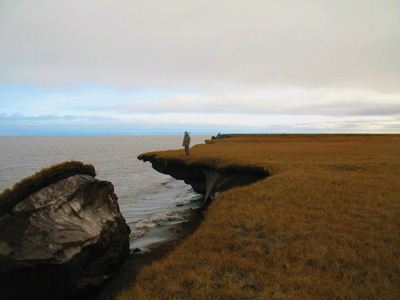
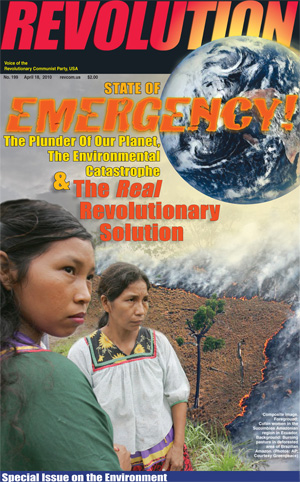
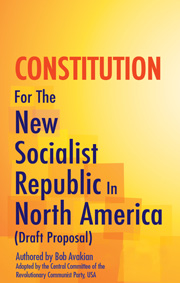
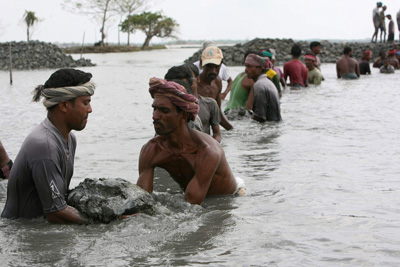

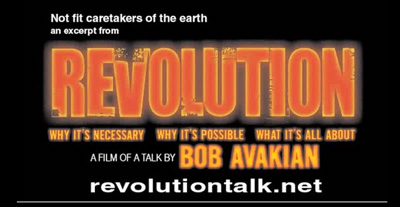
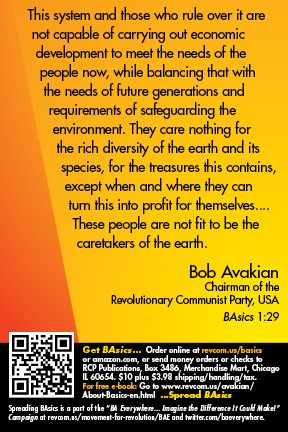 3. Palm card with quote 1:29 from the book BAsics, from the Talks and Writings of Bob Avakian
3. Palm card with quote 1:29 from the book BAsics, from the Talks and Writings of Bob Avakian 